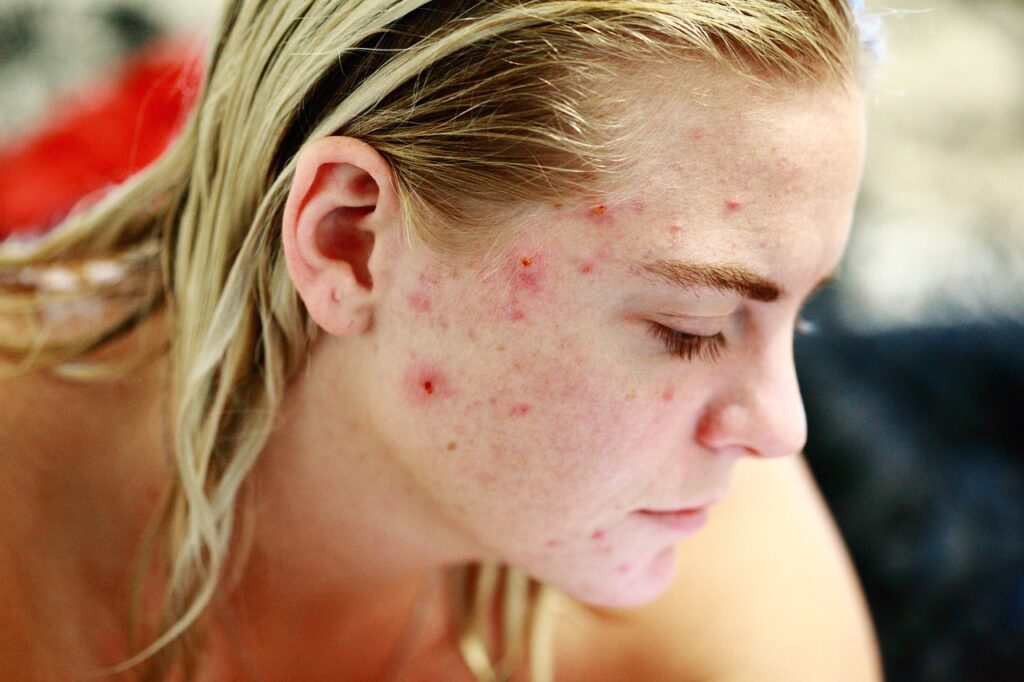
Acne is a multifaceted skin condition influenced by hormonal shifts, health issues, and emotional well-being. Understanding these triggers can help you prevent and manage flare-ups effectively. Explore how specific conditions impact acne and learn actionable tips for clearer skin.
Hormonal Changes and Acne Breakouts
Menstruation Acne
Hormonal fluctuations during the menstrual cycle cause excess oil production, particularly before menstruation, leading to breakouts on the chin and jawline.
Prevention Tips:
- Use salicylic acid to keep pores clear.
- Stick to a consistent skincare routine with non-comedogenic products.
- Incorporate calming masks during premenstrual phases.
Pregnancy Hormonal Acne
Pregnancy-induced acne is a result of increased androgen levels, which stimulate oil glands. These breakouts can appear on the face, chest, and back.
Prevention Tips:
- Choose pregnancy-safe ingredients like glycolic acid.
- Avoid retinoids and harsh treatments unless advised by a doctor.
- Keep your skin hydrated and avoid over-cleansing.
Health Conditions and Persistent Acne
Polycystic Ovary Syndrome (PCOS) Acne
PCOS-related acne is linked to elevated androgens, causing stubborn, cystic breakouts, particularly on the lower face.
Prevention Tips:
- Consider hormonal treatments prescribed by your healthcare provider.
- Opt for a low-glycemic diet to reduce inflammation.
- Use topical products with anti-inflammatory ingredients like niacinamide.
The Emotional Link to Acne
Stress-Related Acne
Chronic stress increases cortisol levels, leading to overactive oil glands and inflamed skin.
Prevention Tips:
- Practice stress-reducing activities like yoga or meditation.
- Use calming skincare products with green tea or chamomile.
- Avoid touching your face, which can transfer bacteria.
Anxiety and Acne Flare-Ups
Anxiety triggers inflammation and hormonal imbalances, worsening acne and delaying healing.
Prevention Tips:
- Maintain a simple and soothing skincare routine.
- Incorporate adaptogens like ashwagandha into your diet to manage anxiety.
- Treat active breakouts with spot treatments containing benzoyl peroxide.
Depression and Skin Neglect
Depression can result in irregular skincare routines and poor dietary habits, worsening acne.
Prevention Tips:
- Establish a manageable skincare regimen.
- Seek professional help for mental health to address underlying issues.
- Use gentle cleansers and moisturizers to keep your skin balanced.
Universal Tips for Acne Prevention
- Cleanse your face twice daily with a mild cleanser.
- Hydrate your skin with non-comedogenic moisturizers.
- Eat a balanced diet rich in antioxidants and omega-3 fatty acids.
- Avoid touching or picking at your skin to prevent scarring.
Understanding the connection between these conditions and acne allows you to adopt a tailored approach to your skincare routine. Embrace these prevention tips to minimize flare-ups and achieve radiant, clear skin.
